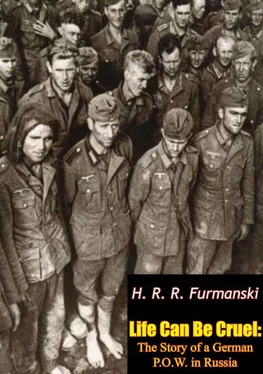slide —the trill—
slide —take the run and—here comes the melody—
slide ,
slide ,
slide —Wait, I thought, that’s not the sound of a slide—what is it? Stop, stop—you’re falling—it’s the ice—it’s cracking and melting. Wait, don’t let yourself fall—stop it, stop it! Just yell, yell for Mother—Mother—yell for Frieda. Go ahead, the words are in your mind—put them in your mouth—yell for help. I can’t, I thought. I can’t yell for anybody. It’s too late. I’ve fallen, and the water is all around. It’s cold. It’s so cold that I can’t yell; I can’t scream. Water, cold water. Look, I told myself, you’re all right. It’s only cold water, and it’s near the edge of the river. Climb out. Hurry—hurry before anyone sees and tells Mother. No, don’t cry. Pull the other leg up and run some place before Frieda comes looking for you. Papa wouldn’t cry. Frieda doesn’t—all right, I’ve stopped crying. There wasn’t even any need to cry because I didn’t fall in all the way, I thought. You’re all wet though, I told myself. And Frieda told you not to go sliding. She’ll be angry with you, and Mother will know right away; she’ll be disappointed. You should have listened to Frieda. But everyone else came out to slide, I reminded myself. If everyone else came, why couldn’t I?
But you stayed too long, I told myself. It’s almost dark, and you should be home getting ready for dinner. And don’t cry. Papa had to go to war, and he didn’t—I’m not crying, I thought. I’m only sniffling because my nose is dripping from the water. I didn’t mean to stay so late. Nobody came and told me to come home. Christel usually tells me when it’s time, but she didn’t, and—no, I’m not crying: I’m only sniffling—like Mother does sometimes. Mother has to work very hard and—But you’re all wet, I reminded myself; how are you going to tell Mother that you forgot it was time to come home and have dinner with her? She will be disappointed, and your clothes are all wet, soaked clear through. You can’t go home in wet clothes. I’ll dry them off, I thought; she won’t be so angry if I dry them off. I’ll run to Christel’s papa’s barn and wait until they dry off. Hurry, hurry. Run to the barn. Don’t sniffle so badly—run. No, no, don’t drag your feet—that makes noise. Just run. But I can’t feel my feet, I protested. I don’t know that I’m dragging them, because I can’t feel them. They must be dry… and yet I can feel the squish of the water in my socks and the heaviness of the wet cuff.
Run, run to the barn, I thought doggedly. No, don’t cough; you’ll make noise, and they’ll hear you. Just go a little farther and you will be at the barn. And don’t sniffle. I can’t help it, I replied—I can’t stop sniffling. I think I should go home. I don’t want to stay at the barn. Everything must be dry; it doesn’t feel wet any more. It feels as heavy as when I left the house—such a long time ago. I must be dry. I’ll go home now. But I’ll walk slowly because I have to stop sniffling and coughing. That’s funny—I was so cold before and now I’m not cold at all, except for a little chill once and a while. I’m warm; in fact, I’m hot. I’ll just apologize to Mother for being late. I won’t tell her I fell in the river. I’ll stop sniffling soon, and I won’t cough. What are you going to say? I asked myself. You’re almost home. You’d better practice out loud what you’re going to say, so you’ll be sure not to cough. Come on, clear your throat and talk. Hurry, hurry. Clear your throat and practice what you’re going to say. You’re at the door now; it’s too late to practice. Don’t be afraid—it’s not a lie that you’re going to tell—and don’t sniffle. Just tell Mother and Frieda that—
But I didn’t have to tell Mother and Frieda anything. As soon as I entered the house I began to cry hysterically, and they ran to me. I’m sure I told them nothing of what had happened: breathing was so difficult that I found myself unable to talk. They quickly carried me upstairs. The clothes that I thought had dried were frozen on me, and the buttons were so brittle that they broke right off. Mother and Frieda worked with an urgency that even I could feel. Mother’s hands worked quickly and steadily as she undressed me, but her voice was sweet and smooth and forgiving, except when she’d whisper something to Frieda.
I wasn’t crying any more: I had to use all my energy to breathe now. And I didn’t think about apologizing, for my head was throbbing so loudly that I was unable to think. My whole body was fighting to catch the air and draw it into my lungs—fighting to shut out the horrible, steady sound of the throb that boomed in the depths of my skull and threatened to break through my temples.
Mother sat with me for a long time, I remember, and tried to ease the pain and lower the fever. I don’t know exactly how long she was there, for I fell into a deep, horrible nightmare. In my delirium I saw the ice topple over me, and I struggled violently to stop it, so violently that I lost my breath and had to fight to get it back. When I stopped to breathe, the ice gave way, and I fell and fell down to the bottom of the river. There was a great fish, and his name was “War,” and he had swallowed Papa, just as he was going to swallow me. I ran out of air and was surely going to drown. I swam with all my might, flailing my arms and churning my legs to push back the water and reach the surface before my lungs burst. But the fish called War kept following me, and from his mouth came the sounds of Frieda’s piano, and I knew he had swallowed her, too; but I couldn’t get out of the water, and I couldn’t turn around to save Papa and Frieda, and the current kept carrying me along with the big fish right behind, so that I couldn’t stop for a moment to find a way out.
The dream went on this way, repeating itself for three days, though I myself had lost track of time. At times it seemed as if the story had played itself for the last time, and I would see Frieda and Mother sitting by my bed, and I would try to tell them that I had fallen through the ice and was having a terrible dream, and that they should go to bed because I was all right now. But the words never came, and I would listen to Frieda speaking to me and try to drink what she gave me, or watch Mother praying next to me with the flour still on her hands and her apron still tied around her. I would try to smile and tell her that everything was all right, but then I’d be afraid again. The breathing would become more difficult. The throbbing in my head turned into the sound of crashing ice, and I would be lost in the same hideous fantasy.
Then on the morning of the third day I fell into what seemed to be a deep sleep. Mother rested, and Frieda whispered to those in the shop that everything was going to be all right. All day long we slept, Mother and I, and she rose in the evening to eat, and then came in to feed me. But I didn’t wake from the deep comatose state that held me in so tight a grip. She gently placed her hand under me and tried to lift me, but I began to choke, and she laid me gently back on the pillows. The choking sound that came from my throat didn’t stop, and the sound frightened Frieda into tears. Mother was frightened too. She watched the small body as it struggled to catch the air to swallow it, to dislodge the web that was knitting itself across the windpipe. Then she shook herself from her fright and moved quickly.
“Get my wrap,” she whispered hastily to Frieda while she began wrapping me in blankets. She slipped on her coat, picked me up swiftly, and ran out of the house, holding her bundle tightly. She must have looked very strange, running down the street—like a mad woman or a thief—but a second look would have made it apparent to those who watched that she ran with urgent and deliberate steps toward the hospital.
Читать дальше












